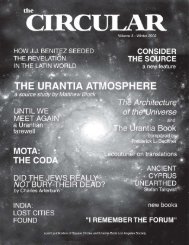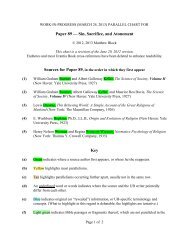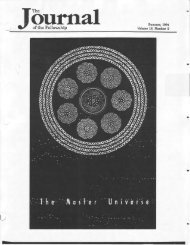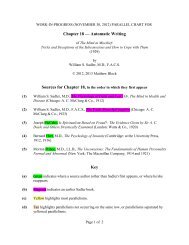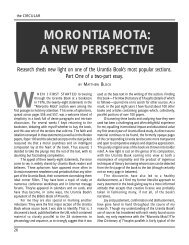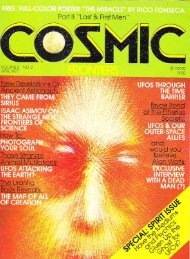8. Unsatisfied Wishes and Sublimation - Square Circles Publishing
8. Unsatisfied Wishes and Sublimation - Square Circles Publishing
8. Unsatisfied Wishes and Sublimation - Square Circles Publishing
Create successful ePaper yourself
Turn your PDF publications into a flip-book with our unique Google optimized e-Paper software.
SOURCE 8: THE MIND AT MISCHIEF<br />
<strong>and</strong> concomitant with the development of<br />
this concept of the reality of the world<br />
there comes gradually to be built up this<br />
ego system of non-sexual complexes. It is<br />
the system of conscious urges which is<br />
coordinated with the enforced recognition<br />
of the reality of existence.<br />
Before the love-attachments of the<br />
Oedipus situation arise, however, an<br />
earlier form of emotional tie between<br />
child <strong>and</strong> parent is found. A small boy<br />
takes his father as his ideal; he wants to<br />
be like him <strong>and</strong> to do as he does (M 90).<br />
8:4.4 In its early days the child looks<br />
upon its parents as the ideal. It desires to<br />
be like them when it grows up.<br />
It is largely imitative of them,<br />
Identifications with the parents form<br />
the nucleus of the Ego-ideal, <strong>and</strong> the<br />
formation of the Ego-ideal is the outcome<br />
of that phase of sexual development<br />
which is dominated by the Oedipus<br />
relationship between child <strong>and</strong> parent;<br />
indeed its formation is primarily brought<br />
about by the need for mastering <strong>and</strong><br />
repressing the Oedipus complex (M 92).<br />
The most important change in the<br />
development of the Ego is the occurrence<br />
of a differentiation within the Ego itself,<br />
whereby a criticising faculty arises,<br />
opposed to the complaisant Ego which<br />
too readily adopts as its own the aims of<br />
the Id (M 88).<br />
It is the development of a differentiated<br />
portion of the Ego which [Freud] calls the<br />
Ego-ideal or super-Ego; the Ego-ideal is<br />
the source of the moral conscience, of<br />
self-observation <strong>and</strong> self-criticism, of the<br />
forces of repression <strong>and</strong> the censorship of<br />
dreams (M 88-89).<br />
<strong>and</strong> further, through this process of<br />
identification of itself with its parents, it<br />
comes gradually to build up the domain<br />
of idealism within the ego system of<br />
complexes;<br />
<strong>and</strong> this domain of the ideal is the<br />
birthplace of the psychic censor,<br />
that mental power which early dares both<br />
to criticize the ego group of complexes<br />
<strong>and</strong> to censor the libido, the sexual<br />
system of complexes.<br />
Later on, this censorship of the mind<br />
becomes exp<strong>and</strong>ed into conscience in<br />
connection with recognition of the moral<br />
st<strong>and</strong>ards of right <strong>and</strong> wrong,<br />
24




